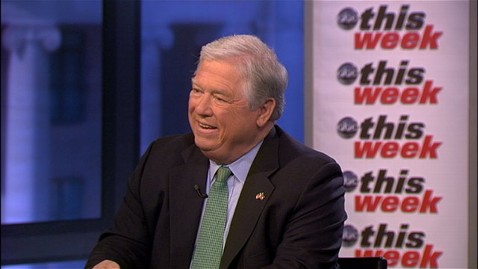Haley Barbour Says He Voted For Newt Gingrich

Former Mississippi governor Haley Barbour is interviewed on "This Week."
After today's "This Week" roundtable, I spoke more with former Mississippi governor Haley Barbour about his views on the Republican presidential race, whether he regrets not getting into the contest, and his defense of his controversial pardons before leaving office in January.
Barbour told me that he voted for former House Speaker Newt Gingrich in last week's Mississippi primary, saying, "out of friendship, I voted for Newt."
"I didn't endorse anybody [before the primary]," Barbour told me. "I didn't want to try to influence anybody's vote, so beforehand I didn't say who I voted for. But Newt and I have been friends a long, long time."
While Rick Santorum took first place in Mississippi, solidifying his overall second place position behind Mitt Romney, Barbour said he has "better sense than to try to predict how this deal's gonna come out" for the eventual nomination.
"Santorum may go on a tear starting in Illinois, who knows," Barbour said. "I don't think anybody's got it wrapped up, so that means everybody's still got a chance."
The former Republican National Committee chairman said he had no regrets about not entering the GOP race himself, saying he "never had the fire in the belly" to run for president.
"I made a very conscious decision after months and months of serious deliberation," Barbour said. "I've been around long enough, been in enough campaigns: You either gotta be all in or not in at all."
If he had run, Barbour said he would have worked to keep more of the focus on President Obama's record on the economy and deficits.
"Every time that we spend a minute not talking about Obama's policies and the failed results of those policies, then we're not taking advantage of our best ground," Barbour said.
Barbour also defended his controversial pardons of four convicted murderers who had worked at the governor's mansion during his term in office, saying the individuals had been rehabilitated and were not a threat. The Mississippi Supreme Court upheld a challenge to the pardons last week.
"When you give people a second chance who have repented, been rehabilitated and redeemed themselves, then give them the best chance you can give them," Barbour said. "That's why I pardoned the ones I released rather than just commuting their sentence, so that they would have the best chance to be successful on their second chance."
While Barbour understands the "resentment and outrage" from family members of their victims, he said consulting with the families directly before the pardons would not have changed his opinion that the men deserved release after nearly 20 years in custody.
"I have no doubt every one of these guys is absolutely guilty as charged," Barbour said. "But the reason we have pardons is not just because some people were wrongfully convicted. … [It's] because we really do believe in second chances for people who get rehabilitated and redeem themselves."